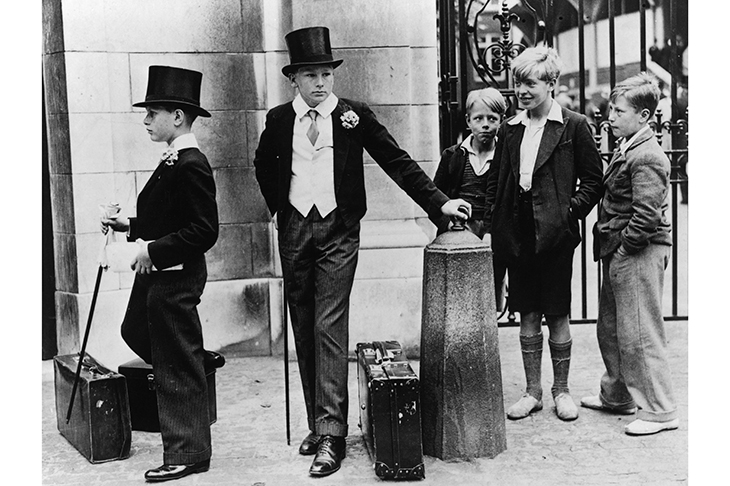‘Repeat after me, gentlemen: “Thank you for not letting me into your Oxbridge college because I belong to the wrong social class and I have been too well taught.’’ ’
I do hope they include this catechism in the new ‘gratitude’ lessons that they’re about to introduce at Eton. They should do because it’s true. Across the country, private school parents who have scrimped and saved about £40,000 a year for fees are increasingly finding that their sacrifice is being rewarded by near-automatic Oxbridge rejection for their blameless offspring.
And who is speaking out against this class war-driven injustice? Almost no one. Which is why Anthony Wallersteiner, headmaster of Stowe, took so much flak for telling it like it is. ‘The rise of populists and polemicists has created a micro-industry in bashing private schools,’ he told the Times. ‘There’s a much more concerted effort by [Oxbridge] admissions tutors to drive down the number of places given to independent schools,’ he went on — to a deafening chorus of near silence from his fellow public school heads.
Wallersteiner is dead right but the reason he won’t get much support from his peers is because most of them, deep down, agree on private education: that it’s a bastion of unearned privilege, that it needs shaking up in order to accommodate itself to the modern world and that one really mustn’t grumble if its boys and girls are penalised by the system because, hey, maybe that’s only fair.
How do I know this? Because I’m just coming to the end of more than a decade of putting my kids through private school and what I’ve witnessed is a creeping malaise not dissimilar to the one afflicting the Conservative party: institutions that no longer believe in their own brand, that are desperate to pretend they are something they are not (and never should be) in order to impress the kind of people who are always going to hate them anyway.
Take those ‘gratitude’ lessons at Eton. These have been launched, apparently, ‘after a review of teachers and staff found that they felt gratitude was an important trait which was not promoted by the school’. Classes may teach things like how to ‘write thank-you cards for everyday acts of kindness: “Thank you for taking time to talk to me today.”’ Can the school really not see what a massive own goal this is?
First, it plays into the hands of all those who think that Eton boys are a bunch of pampered, arrogant, entitled, snooty toffs. But the vast majority in my experience are supremely well-mannered, considerate and modest. And also fully conscious of their duty to give something back.
When Boy was there, for example, he gave up an afternoon every week to visit a local comprehensive school to help mentor a boy and a girl through their English Literature GCSEs. It wasn’t compulsory — simply a reflection of the Eton public service ethos that is instilled in the boys from the moment they arrive. Often the formative work is done by their house ‘dame’ — the mother substitute who teaches them everything from how to dress properly to the importance of thank-you letters. These ‘gratitude’ classes are fixing a problem that never existed.
Second, it is deeply off-putting to the kind of parents who should be sending their children to Eton: not ones who want it to be like every other touchy-feely progressive institution but ones who appreciate that its idiosyncrasies and traditions and archaisms are what make it so great. There was terrifying talk at the beginning of the new Head Man’s tenure that the school’s penguin uniform might be abolished. Happily, this got a lot of resistance, not least from the boys. But it’s a measure of just how much madness there is abroad in the private education sector right now that serious consideration was given to destroying, on some trendy whim, arguably Eton’s most distinctive selling point.
Boy had a fantastic education at Eton. But almost everything that was good about it, from the arcane terminology to the kit to the remarkable independence the boys enjoy, was the result of the accumulated values of its first 550 years of existence. It was not the result of any measures that modernisers have introduced in the past decade or so.
Here are a couple of things that particularly irked me: one or two bolshie beaks palpably not giving a toss about the massive increase in Oxbridge rejections because, hey, this actually gelled quite nicely with their own lefty prejudices; and the lecture — which an entire year group was forced to attend — by Laura Bates, founder of the Everyday Sexism Project.
Eton attracts some incredibly high–powered speakers from all manner of fields: world leaders, explorers, entrepreneurs, you name it. But all these talks are voluntary, because that’s how Eton rolls: right from the start you are expected to forge your own intellectual destiny.
Apparently, though, it was deemed so important the boys should be lectured by a third-wave feminist on entrenched male privilege, gender injustice, and the inner rapist just waiting to burst out of every young man given half the chance, that this particular lecture was made compulsory. Apart from bespeaking a terrible lack of faith in the boys’ manners and sense of sexual propriety, it represented a de facto endorsement of the kind of culturally divisive, hard-left identity politics which schools like Eton ought to be resisting at all costs, not glibly endorsing.
I’m focusing on Eton, but most public schools have the same problem. If you want to abolish public schools you needn’t worry: most are so busy trendifying themselves into politically correct conformity that soon no one will want to pay for them anyway.
Got something to add? Join the discussion and comment below.
Get 10 issues for just $10
Subscribe to The Spectator Australia today for the next 10 magazine issues, plus full online access, for just $10.
You might disagree with half of it, but you’ll enjoy reading all of it. Try your first month for free, then just $2 a week for the remainder of your first year.















Comments
Don't miss out
Join the conversation with other Spectator Australia readers. Subscribe to leave a comment.
SUBSCRIBEAlready a subscriber? Log in